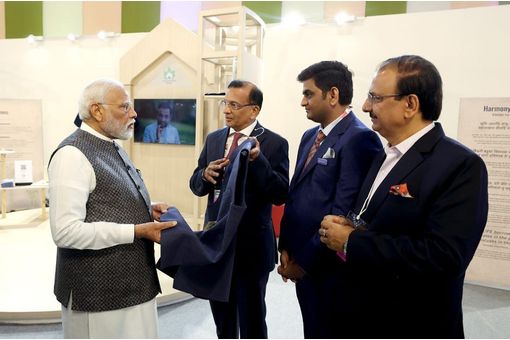Interviews
Govt must pay heed to highest employment sector - NITMA
29 Nov '08
6 min read
The world recessionary trend is going from bad to worse. At one time, it was perceived that this is the worst but to everybody's surprise and shock, it still became worse. On top of that, the recent European/Japanese recession has further created anxiety in the international circles.
Talking exclusively to Fibre2fashion, on this topic, Shri Sunil K Jain, President, Northern India Textile Mills Association (NITMA) said, “All this will lead to huge unemployment. The textile industry was already reeling under numerous issues which have been pinpointed by a number of Trade Associations at various forums time and again and since early last year but the decision makers have not been realizing the same.”
“In view of the coming elections, the Government was attracted once again to give the maximum benefit to our farmers without creating a proper equilibrium between the farmer and the industry, and increased the MSP of cotton fibre by 40 to 47 per cent. The industry cried foul but without any action or reaction. Now the situation is that the international prices are lower than the MSP and the entire textile industry is in a fix. The farmers think that Government will buy at MSP where as the market forces are bringing the cotton prices down”, stated shri Jain, who is also the CMD, I C Textiles Ltd.
The textile industry is the largest employer in the industrial sector which NITMA have been continuously pinpointing to the Government and that unemployment in this sector will be a huge loss for the country but the same was not heard because these unemployed workers from the mills were easily getting jobs in the construction sector and therefore the Government did not realize the need to do something for unemployment in textile sector.
“However, to correct the situation we propose a few measures where if still timely action is taken, things can be corrected to a great extent”, asserts Shri Jain.
All Industry Rates of Duty Drawback for all textiles & clothing products be increased at least by 4 percent immediately till the end of Sept 2009. Pakistan has reintroduced R& D assistance at 6 percent for garments. R & D assistance for other textiles expected soon. China has increased VAT refund rates from 9 to 13 percent for synthetic textile products and from 11 to 13 percent for others. China has again raised tax rebates on textile and garment exports for the second time in three months to help producers counter rising costs and a slowdown in demand. Rebates on textiles, apparel and garments will go up to 14 percent.
The Central Government should refund the unrebated state levies of about 6 percent and workout a mechanism for the same immediately.
Banks have been instructed to withdraw the interest subvention from September 30, 2008 much before as originally planned till March 31, 2009, and charge commercial rate of interest on export credit with effect from October 1, 2008 dampening the spirit of exporters, who have already been plagued by high inflation and increased raw material cost. In order to help the ailing textile industry, interest subvention of 4 percent should be given for export credit till March 31, 2010, with effect from October 1, 2008 from retrospective effect.
Talking exclusively to Fibre2fashion, on this topic, Shri Sunil K Jain, President, Northern India Textile Mills Association (NITMA) said, “All this will lead to huge unemployment. The textile industry was already reeling under numerous issues which have been pinpointed by a number of Trade Associations at various forums time and again and since early last year but the decision makers have not been realizing the same.”
“In view of the coming elections, the Government was attracted once again to give the maximum benefit to our farmers without creating a proper equilibrium between the farmer and the industry, and increased the MSP of cotton fibre by 40 to 47 per cent. The industry cried foul but without any action or reaction. Now the situation is that the international prices are lower than the MSP and the entire textile industry is in a fix. The farmers think that Government will buy at MSP where as the market forces are bringing the cotton prices down”, stated shri Jain, who is also the CMD, I C Textiles Ltd.
The textile industry is the largest employer in the industrial sector which NITMA have been continuously pinpointing to the Government and that unemployment in this sector will be a huge loss for the country but the same was not heard because these unemployed workers from the mills were easily getting jobs in the construction sector and therefore the Government did not realize the need to do something for unemployment in textile sector.
“However, to correct the situation we propose a few measures where if still timely action is taken, things can be corrected to a great extent”, asserts Shri Jain.
All Industry Rates of Duty Drawback for all textiles & clothing products be increased at least by 4 percent immediately till the end of Sept 2009. Pakistan has reintroduced R& D assistance at 6 percent for garments. R & D assistance for other textiles expected soon. China has increased VAT refund rates from 9 to 13 percent for synthetic textile products and from 11 to 13 percent for others. China has again raised tax rebates on textile and garment exports for the second time in three months to help producers counter rising costs and a slowdown in demand. Rebates on textiles, apparel and garments will go up to 14 percent.
The Central Government should refund the unrebated state levies of about 6 percent and workout a mechanism for the same immediately.
Banks have been instructed to withdraw the interest subvention from September 30, 2008 much before as originally planned till March 31, 2009, and charge commercial rate of interest on export credit with effect from October 1, 2008 dampening the spirit of exporters, who have already been plagued by high inflation and increased raw material cost. In order to help the ailing textile industry, interest subvention of 4 percent should be given for export credit till March 31, 2010, with effect from October 1, 2008 from retrospective effect.
Popular News
Leave your Comments
Editor’s Pick
Andreas Rass
ZIMMER AUSTRIA | Digital Printing Systems
Aleksandre Akhalkatsishvili
Label - Aleksandre Akhalkatsishvili
































-Ltd..jpg?tr=w-120,h-60,c-at_max,cm-pad_resize,bg-ffffff)





.jpg?tr=w-120,h-60,c-at_max,cm-pad_resize,bg-ffffff)
.jpg?tr=w-120,h-60,c-at_max,cm-pad_resize,bg-ffffff)






